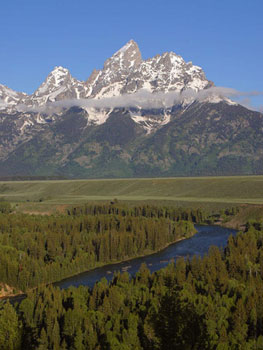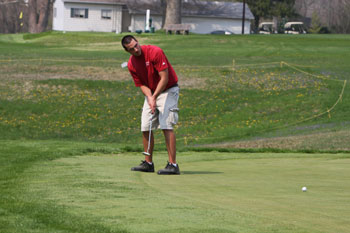Lucky in So Many Waysby Brent Harris |
| Printer-friendly version | Email this article |
|
The job Wabash alumnus Brandon Barkley ’06 lined up for him in Jackson, Wyoming, was ideal for the NCAC All-Conference second- team golfer. “This was easily the nicest golf course I had ever seen,” Russell says of 3 Creek Ranch. “I was introduced to new techniques and every-thing required to keep a top-notch golf course and country club running day to day.” During down time, the crew even got a chance to play the course. But the athlete couldn’t resist the many other sports that living in Jackson offered. “Anything outdoors is fair game out there,” Russell says. “I took up mountain running, mountain biking, tubing, whitewater rafting, and, of course, mountain climbing.” On Friday, July 10, a co-worker pointed to the Grand Tetons and asked if Russell was interested in joining a group to climb 12,350-foot Teewinot Mountain. Russell hesitated. He’d been on several climbs that summer, knew basic techniques, and how to use the equipment. But Teewinot would be more difficult. “I knew there would be snowfields, I was not really experienced crossing snow,” Russell admits. “That worried me. He debated the offer the entire afternoon. At the end of his shift, he decided that he would go. It was a decision that would lead to the first major mountain rescue in the Tetons for the summer of 2009. Russell recalls the moment he and his companions cleared the timberline during their ascent the next morning. “The view was incredible. The sun had just come up over the other mountain range across the valley from us. We could see Jenny Lake. It was unbelievable.” Soon the group reached the first snowfield, which Russell handled with little difficulty. Near the summit, he waited with other members of the team while one climber scaled the peak of Teewinot. When the climber returned, the men reviewed their descent instructions, divided into two groups for safety, and made steady progress down the mountain. Sam had just one last snowfield to traverse. “One of the guys crossed before me and slipped,” Russell recalls. “He caught himself with his ice axe and made the rest of the trip.” Russell was next. But halfway across he felt his feet come out from under him on the steep slope. He tried to jam his axe into the snow and ice mix, but it wouldn’t catch. A second later, Russell was tumbling down the mountain’s face. “I saw how far down the rocks were and how steep the mountain was, and I thought, Well, this is it. I have no chance of surviving this. I was trying to tighten up my body, protect anything I could, mainly my head. “But I got lucky in so many ways. My ice crampon caught a portion of rock, kicking me up in the air.” After a fall of nearly 250 feet, Russell came to rest on a rock ledge. Had the outcropping not caught him, he would have fallen another 1,000 feet to his death. “I landed face-first on the ledge,” he explains. “It took a moment to realize I was still alive.”  Alive, but in severe pain. The fall broke Russell’s left fibula, sprained his left ankle, dislocated his shoulder, damaged the tendons in his triceps, and cracked four bones near his left eye. Alive, but in severe pain. The fall broke Russell’s left fibula, sprained his left ankle, dislocated his shoulder, damaged the tendons in his triceps, and cracked four bones near his left eye. “I had been screaming on the way down and for the first few moments after the fall,” he says. “Then I started trying to figure out just how injured I was. I thought my hands might have been shattered because I had no feeling in them and saw them swelling. I had massive gashes everywhere. One of our advanced climbers made the 20-minute climb down to me. He was a nurse and was able to stabilize me until the helicopter could arrive to get me off the mountain.” Mountain emergency workers call it a “short-haul” rescue: Russell was placed in a litter that dangled below a helicopter for a short, quick ride to the valley floor next to Jenny Lake, where an ambulance carried him to St. John’s Medical Center in Jackson. Surgeons repaired the gaping wounds on his head and legs. They removed rocks from his elbows and put a screw in his left ankle. Three days later, Russell convinced doctors to release him from the hospital. They didn’t offer much hope for Russell to resume his final golf season in the fall. Perhaps he could begin playing in the spring. “When I got home, a doctor in Indianapolis took the cast off my leg,” Russell says. “I didn’t have a lot of pain. So he ran me through some tests and told me I could start doing some simple golf exercises, but no full swings.” Russell kept working his way back, developing his strength until doctors cleared him to play in the first match of the season, the North Coast Athletic Conference Fall Championship Event at Ohio Wesleyan. Wabash Golf Coach Mac Petty was amazed. “That was two months it took him to recover from those injuries —that’s incredible,” Petty told local reporters as the fall season got underway. “And he seems to be in good shape.” In fact, the senior posted one of the best rounds of his career, shooting a 71 on the first day before tying for third place in the match. He played the entire fall schedule, right up to the final contest at the DePauw Small College Classic. On that day, three months after nearly losing his life on Teewinot, Russell stepped up to the 14th hole at Deer Creek Golf Club in Clayton, Indiana. He lifted a seven-iron shot toward the flagstick 167 yards away and watched as the ball settled into the hole for his first collegiate and second career hole-in-one. “The whole fall season amazes me, because I still can’t put a lot of weight on my left side,” Russell says. “I’ve learned what I can and can’t do right now. I don’t know if the injuries made me think more about my game, but it’s hard to argue with the results. The one thing I always knew, though: I was definitely going to play.” Russell is preparing for his final spring season as a Wabash golfer. He knows that he has overcome his injuries, and somewhere in the future the mountains call again. “I do hope to go mountain climbing again. I appreciate the life I have, and I’ve learned that it can be taken away at any time. I also know you have to move forward. I can’t be afraid of getting back up there.”
|

 Wabash senior Sam Russell went to Wyoming to work at an upscale country club, not to scale mountains.
Wabash senior Sam Russell went to Wyoming to work at an upscale country club, not to scale mountains.